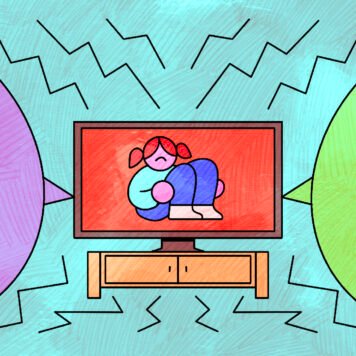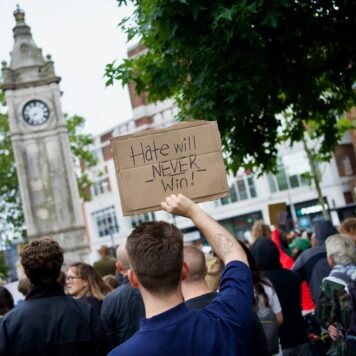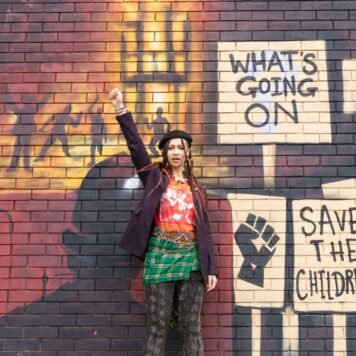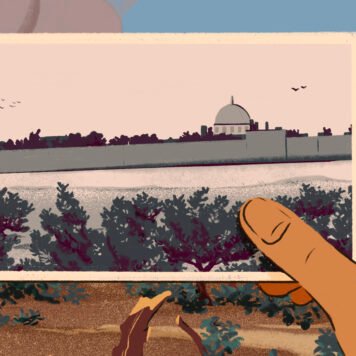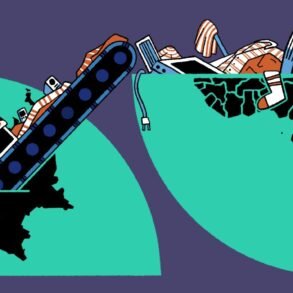I recently moderated a conversation called “Our wounds can be bridges: the threads that bind us from Syria to Ukraine” as part of Post-Extractive Futures series, co-produced by War on Want, Tipping Point UK, JunteGente and my podcast, The Fire These Times.
The panellists were Ukrainian writer and historian Taras Bilous, Syrian writer and activist Yassin Al-Haj Saleh, Ukrainian academic Yuliya Yurchenko and Syrian activist and writer Wafa Ali Mustafa.
In the two hours of conversation, an overwhelming topic we kept coming back to was pain. They spoke of the pain that comes not just from having to deal with impossibly difficult situations, but from also seeing people they thought would be allies – people on the Left – deny the legitimacy of their struggles.
The anti-imperialism of idiots
Instead of allyship and support, they’ve seen prominent Left groups downplay or even sympathise with the oppressive regimes they have been fighting – in this case, the Russian and Syrian ones.
In the words of Taras, “the Western Left, with some notable exceptions, has been failing at standing in genuine solidarity with victims of non-Western imperialism and authoritarianism.”
This phenomenon is not new on the Left. Thinkers from George Orwell to Aimé Césaire to Zygmunt Bauman to Moishe Postone have criticised Leftist sympathies of authoritarianism in the context of Stalinist tyranny (and post-Stalinist nostalgia). The term ‘Tankie’, which has become more prominent in recent years to describe authoritarians in online Left spaces, has been used since 1956 to describe the British communists who stood by official party line and supported the USSR tanks sent to crush the Hungarian Revolution.
The conversation between Taras, Yassin, Yuliya and Wafa was made possible by a shared feeling of betrayal and abandonment, albeit to different extent. This same feeling has been expressed by many Syrian and Ukrainian activists recently and over the past few years.
Whether it be with Ukrainians’ 2014 Revolution of Dignity (also known as the Maidan revolution) or with Syrians’ 2011 Revolution – both of which the four guests acknowledged as part of a global wave of pro-democracy protests – we saw a significant part of the Western Left meet these incredible events with suspicion and even outright hostility.
Incidentally, Taras, who wrote ‘a Letter to the Western Left‘ the day after Russia’s large-scale invasion began, cited British-Syrian writer Leila Al-Shami’s 2018 piece on ‘the anti-imperialism of idiots.
Al-Shami, writing in the context of Syria, was referring to a tendency on the Western Left to dismiss or even excuse non-Western authoritarian governments in the name of cold war-era ‘campism’. Which is, in essence, an enemy-of-my-enemy attitude which downplays governments that purport to be opposed to the West, and which divides world governments into ‘camps’.
Reflecting on this reaction to the conflicts in both Ukraine and Syria, Sri Lankan feminist Rohini Hensman called it ‘pseudo-anti-imperialism‘. In contrast with genuine anti-imperialism, which opposes all forms of imperialism, regardless of who is doing it, this ‘campist’ attitude effectively cheers on states like Russia or China in the name of ‘opposing the West’.
The ‘war on terror’, but on the Left
The irony here is that those Leftists who deny the crimes of regimes like Russia’s or Syria’s don’t seem to want to accept that those regimes’ first victims are often Leftists and activists themselves. A reality which was faced by both Yassin and Wafa.
They were both active participants of the Syrian revolution and are now living in exile. Yassin spent the entirety of his 20s and most of his 30s in Syrian jails for his membership of an opposition communist party. Since 2013, they’ve also both had loved ones forcibly disappeared: Wafa’s father Ali Mustafa by the Assad regime; Yassin’s wife Samira Khalil by an Islamist group; and his brother Feras Al-Haj Saleh by ISIS.
And yet, despite being at the frontline of fighting state fascism and religious extremism at the same time, Syrians like Yassin and Wafa have been attacked as ‘Jihadis’ by Western Leftists.
Wafa explained that she has to defend her father from accusations on a quasi-daily basis. The irony isn’t lost on us here: many Western Leftists who claim to have opposed George W. Bush and Tony Blair’s post-9/11 ‘war on terror’ discourse often reproduce and use it to deny the crimes committed against the Syrian people (just as they have done with Bosnian Muslims during the Bosnian genocide, or are still doing with Uighur Muslims today).
This takes concerns of ‘in-fighting on the Left’ to quite a different level. It is one thing to be annoyed at intra-Left fighting but it is another thing to be at the receiving end of state oppression, expecting Leftwing solidarity, and getting demonised instead. Indeed, the feeling of betrayal on the panel was palpable, perhaps best expressed by Yuliya:
“We need to be building solidarities through listening to each other and allowing those who are fighting to tell their story, not projecting some hundred-year-old templates of what things are supposed to look like. Do what historical materialists are supposed to do: study the material and then develop your bloody theory! Do not go with your theory book where you don’t even speak the language and you’ve never stepped foot before.”
Yuliya’s criticism speaks to a lack of understanding of the reality for those on the ground. The stakes are far higher for Syrians and Ukrainians in such a context compared with the average Westerner who has the luxury of turning other people’s struggles into abstractions, and who can simply disconnect whenever they want.
I’ve seen this in action and lack of accountability too many times to count, especially on social media. There are no consequences for those trolling, demonising or dismissing someone who is tweeting under the very real threat of bombing. .
It is too easy for people to do this and then switch tabs or scroll down to the next thing that catches their attention. They don’t have to think about the person in Aleppo or Ghouta or Homs or Idlib or Kharkiv or Mariupol or Kherson or Odesa when they only exist on their phone or laptop.
Subscribe to shado's weekly newsletter
Exclusive event news, job and creative opportunities, first access to tickets and – just in case you missed them – our picks of the week, from inside shado and out.

Persuading the Western Left
Despite these very clear frustrations, a lot of us still try and succeed in using the attention of Westerners to get our voices heard, even if only temporarily. As Taras explained: “There is a huge responsibility on the Western Left. We have to do something with these idiots so that they understand something. We are weak here [in Ukraine], but they are the biggest audience that our words matter to.”
But given that it’s so difficult to persuade the Western Left about the reality of our struggles, why do many still do it? Simply put, because there are rarely other options available.
This is why many Ukrainians today are doing the same thing that Syrians have tried to do for over a decade now.
Ukrainians can’t spend their time trying to persuade Russians because Russians are the ones doing the bombing. They can’t spend their time trying to persuade people in the Global South because there is very little the average person there can do.
The reality is that the countries most directly able to impact their lives and help them defeat the Russian invasion are in Europe and the US. Therefore, this is where their energy has to go. It is a matter of immediate survival.
And although Syrians do not have the same European connection that Ukrainians do, the methodology was similar.
During the 2016 siege and subsequent fall of Eastern Aleppo, many Syrians sought to persuade Western hearts and minds to take action to help them. This was done through articles in various Western media outlets, and through direct testimonies on social media.
I was in London at the time, assisting Syrians in trying to get various members of the Labour Party to help, but to no avail.
One of the few MPs who was receptive, Jo Cox, was assassinated in June of that year by a fascist, weeks before the group I was with had hoped to meet her. Cox actively campaigned to raise funds for the Syrian civil defense group, the White Helmets, who have been repeatedly targeted by the Assad regime, Russia and various Islamist groups, in additon to being the target of a very successful online disinformation campaign. To this day, it is almost impossible to look up the White Helmets without finding the fruits of that campaign.
Many Syrians did try to persuade other Arabs in regional media outlets, and this worked for some time in 2011 and 2012. But the vast majority of Arabs also live under dictatorships, be they military or monarchical, and are themselves dealing with impossibly difficult circumstances.
This became even more difficult following the (ongoing) counter-revolutions which followed the Arab Spring. Furthermore, the countries most directly affecting Syrian lives – Russia, Iran and Turkey – are not democracies in any meaningful sense of the word and dissidents there are regularly crushed.
The only option left therefore was to try and change the hearts and minds of Westerners. Unfortunately for Syrians, widespread Western chauvinism, racism and Islamophobia in addition to Russian disinformation discouraged most people from paying close attention to what was happening in Syria.

Syria is the world
Had they done so, they would have understood that “Syria is the world because the world is in Syria”, as Yassin al-Haj Saleh repeatedly reminded us.
In addition, to those of us who were concerned with Syria back then, the links between the far right and the Russian regime was always clear.
That the regime’s disinformation was gaining grounds in online Left spaces raised all sorts of alarm bells long before Putin decided to launch his full-scale invasion. It is why so many were mobilised to prevent it from succeeding in Ukraine. Most of us can’t do much on the ground, but online spaces have become a crucial tool in the authoritarian manual, and there at least we can fight back.
We’ve seen with Syria the willingness of the ‘international community’ to allow an entire country to become destroyed by a single man and his regime, as long as the ‘problem’ stays ‘over there’.
When ‘it’ came to Europe’s shores in the form of Syrian and other refugees, the EU was sent into a self-destructive frenzy that had very little to do with the actual Syrians seeking refuge and everything to do with what Europeans thought of them.
In other words, what Europeans think of us can be a matter of life and death. It is why the Russian regime is still desperately trying to portray all Ukrainians as Nazis.
In contrast, the Russian regime didn’t have to exert much effort to create anti-Syrian disinformation because European governments were already demonising Syrians, and European Leftists were rarely in disagreement. I have personally seen the discourse of ‘Assad is fighting terrorists’ online and in-person in Left spaces in the UK, Spain, Italy, France and Germany.
For now, Ukrainians (although not all, as Roma refugees would attest to) have been mostly spared this treatment. They have also, thus far, been spared accusations of being demographic threats or of ‘stealing our jobs’.
Again, for now.
The overwhelming experience of Syrians in Europe suggests that Ukrainians are fighting against time and the short attention span of the so-called international community.
Perhaps that’s why Ukrainians understood very early on that they had to fight with everything they had, and convince Western Europeans that this war deserved their interest as it affected them.
Syrians have learned the hard way what happens when the so-called international community concludes that mass murder does not concern ‘us’. It may sadden ‘us’, sure, but it is happening ‘over there’, not ‘over here’.
The risk we face is that the more Ukrainian cities resemble the destruction of Syrian cities (or Grozny 1999-2000, or Sarajevo 1992-1996, to name a few), the greater the mental distance between these cities and London or Paris, or other European metropoles, will become.
For now, many Western Europeans believe that Russia is a threat to them, and Eastern Europeans, fearful of a return of a vengeful Russian imperialism, have been relatively successful at making that case (despite open frustrations with some Western European states, notably Germany).
There are of course exceptions to all of these. Leftists all over the world have stood with Ukrainians, including British and Ukrainian trade unions.
The problem is that the very idea of Ukrainians resisting Russian imperialism or Syrians resisting Assad and his backers remains a debatable topic on the Left, in ways that other struggles such as the Palestinian one are not. This forces Leftists in Ukraine and Syria to have to spend their time persuading Western Leftists of the legitimacy of their struggles.
‘All Lives Matter’, but on the Left
At the time of writing, the socialist magazine Jacobin hosted a debate on the question of whether the Left should support sending military aid to Ukraine.
This has been a core demand of virtually all Ukrainians from the moment Putin decided to send in his tanks. There has been almost no disagreement on this amongst Ukrainians, because they recognise the urgency demanded by the situation. This urgency is nowhere to be found in these debates, as can be concluded from the fact that they are still happening over two months into the full-scale invasion.
As it happens, the debate was published the day AP released an investigation concluding that at least 600 Ukrainians were murdered in a single Russian airstrike on the Donetsk Academic Regional Drama Theater in Mariupol on 16th March.. This massacre happened around the same time as the Bucha massacre where Russian forces tortured, raped and murdered hundreds of Ukrainians. And these are just two examples among the countless horrors committed by Russia since 24th February.
This frustration over the priorities of Western Left groups could also be seen in the resignation of the Polish Left group Razem from Progressive International (PI), an international organisation uniting and mobilising progressive left-wing activists and organisations, and DiEM25, a pan-European political movement. The Ukrainian Spilne ‘Commons’ group also resigned from PI, with both groups stating it was ‘shameful’ the organisations refused to “unequivocally condemn Russian aggression.”
Reflecting on this decision, Razem’s Zofia Malisz said “the further west you go away from our region, the less understanding you have.” Polish anarchist Zosia Brom expressed this frustration even more directly by writing ‘fuck leftist westplaining‘.
Malisz’s analysis helps explain why, as Taras recently wrote, “Scandinavian left-wing parties as well as Eastern European ones have listened to Ukrainians and supported arms supplies to Ukraine”. These are places that, after all, have direct experience of Russian imperialism in recent memory, and Russian politicians have openly shown clear hatred of these countries’ independence as well.
Those same Left groups that Razem and Spilne split from have no difficulties acknowledging the right of resistance by any means necessary when it comes to contexts they understand better, such as the Palestinian one.
We don’t see debates regarding the Palestinan right to resist Israeli occupation and settler colonialism in most Left spaces. And yet, Ukrainians and Syrians (and Bosnians, and Uighurs, and Taiwanese, and so many more) are not given the same treatment.
Debates regarding whether we should support a people’s right to resist by any means necessary are the moral equivalent of the conservative ‘all lives matter’ response to Black Lives Matter (BLM), or to those pro-Israel apologists who regularly deny Israel’s occupation and settler colonialism.
Leftists usually have no difficulty understanding that all lives cannot be said to actually matter as long as Black lives do not actually matter, just as we cannot decontextualise actions taken by Palestinians against Israeli authorities from the decades of Israel’s brutal and illegal occupation. Similarly, we cannot understand the urgency expressed by Ukrainians without understanding the very long legacy of Russian imperialism and colonialism.
Ukraine is neither Palestine nor BLM, but neither are Palestine and BLM the same thing. We find little difficulties in acknowledging that the legacy of slavery and Jim Crow in the USA is not the same as the legacy of settler colonialism in Israel-Palestine, but we nonetheless see solidarity efforts between these two causes.
Imagine if, instead of quickly condemning oppression in these contexts and supporting resistance to it, we saw debates amongst Western Leftists about whether Palestinians have a right to defend themselves, or whether the Black resistance to white supremacy and the carceral state in the USA should be supported.
This is how the Western Left’s response to the Ukrainian resistance over the past two months looks like in post-Soviet countries.
There are no two equal sides in this story. There is no Ukrainian equivalent to Russia’s mass murder. Nor is there a Ukrainian equivalent to Russia effectively kidnapping over a million Ukrainians in just two months.
If there is no principled stance that prioritises the right of all to live free of oppression, we render ourselves at best useless and at worst complicit in the normalisation of authoritarian principles.
Putin must lose in Ukraine because Ukrainians refuse to be erased by Russian imperialism. If we fail to show real support, we will have no right to expect solidarity against the fascists in our own neighbourhoods.
What can you do?
Books:
- The Future Is History: How Totalitarianism Reclaimed Russia by Masha Gessen
- Nothing Is True and Everything Is Possible: The Surreal Heart of the New Russia by Peter Pomerantsev
- This Is Not Propaganda: Adventures in the War Against Reality by Peter Pomerantsev
- Bloodlands: Europe Between Hitler and Stalin by Timothy Snyder
- Putin’s Russia: Life in a Failing Democracy by Anna Politkovskaya
- Red Famine: Stalin’s War on Ukraine, 1921-1933 by Anne Applebaum
- The Gates of Europe: A History of Ukraine by Serhii Plokhy
Articles:
- Self-Determination and the War in Ukraine by Taras Bilous
- A letter to the Western Left from Kyiv by Taras Bilous
- The ‘anti-imperialism’ of idiots by Leila Al-Shami
- Fuck leftist westplaining by Zosia Brom
- Syrian Doctors Are Teaching Ukrainians How to Prepare for Chemical Attacks by Olga Tokariuk
- Moscow Anarchist Black Cross updates, May 2022
- The War in Ukraine Is a Colonial War by Timothy Snyder
- Russia’s Long Disdain for Ukrainian Nationhood by Yaroslav Trofimov
- Time to Question Russia’s Imperial Innocence by Botakoz Kassymbekova and Erica Marat
- Against Putin’s War in Ukraine interview with Ilya Budraitskis
- Ukrainian Tales by Uilleam Blacker
- Ukraine: Beyond the Postsoviet by Ileana Nachescu
- Mentions of Kyiv and Ukraine removed from Russian schoolbooks: “We have a task to make it look as if Ukraine simply does not exist” by Elizaveta Nesterova
- The Belarusian railway workers who helped thwart Russia’s attack on Kyiv by Liz Sly
- From Managed Democracy to Fascism by Ilya Budraitskis
- US-plaining is not enough. To the Western left, on your and our mistakes by Volodymyr Artiukh
- Russia and the US have more in common than you might think by Chrissy Stroop
- Old Ukraine Is Gone. Ukrainians Carry On by Natalia Antonova
- The Futures of Russian Decolonization by Anna Engelhardt
- How Vladimir Putin Lost Interest in the Present by Mikhail Zygar
- Addressing Russian Propaganda by Praleski
Podcasts:
- Ukraine Without Hype: Episode 18: How many acts of Genocide does it take to make Genocide?. This is the episode I was on, but I recommend their podcast in general as well
- My podcast, The Fire These Times, is doing a Ukraine series with Romeo Kokriatski. So far we did two episodes, one with Leila Al-Shami (mentioned in this article) and one with Romeo.
- Ukrainecast by the BBC, a daily podcast since February 24th
- Four episodes on the Ezra Klein Show with: Masha Gessen, Timothy Snyder, Volodymyr Yermolenko and Ivan Krastev
- From Embers: Solidarity with the people of Ukraine – Against the Russian State
- It Could Happen Here: An Interview With An Anarchist Protester in Russia
- New Lines Podcast: Putin’s Military Adventures, From Syria to Ukraine — with Anand Gopal and Faisal Al Yafai








